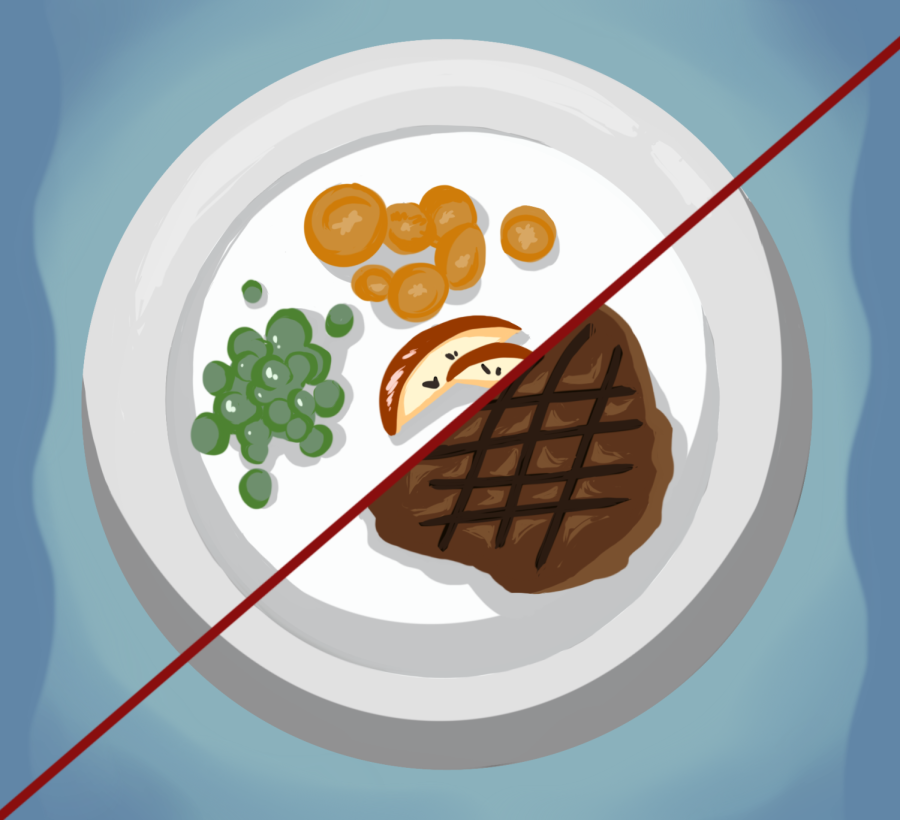SCHS students share their experiences being vegetarian
Vegetarianism is the practice of abstaining from eating meat and byproducts of meat.
Currently in the U.S., many citizens are opting for plant-based diets as suggested by the Vegetarian Resource Group’s study, which revealed that 10 to 15 percent of Americans identify with diets forgoing meat. Reflecting the rising diet diversity in the U.S., multiple students at SCHS partake in diets that stray from the norm, one particular one being vegetarianism.
Vegetarianism is the practice of abstaining from the consumption of meat and sometimes any byproducts of meat. Students discuss their reasons for opting for a vegetarian diet that range from family values to ethics to religion.
Sophomore Ashika Sugali recounted that while her transition to vegetarianism may have once been due to her religious beliefs, it is now based on her own personal preferences.
“I was originally just not eating any beef or red meat because I’m Hindu,” Sugali said. “I never really liked the taste or the feeling of eating meat, so I just decided to become completely vegetarian.”
Freshman Miraya Patel, however, views her relationship with animals as transactional and sees the consumption of them as a waste of good products.
“They give us food. Cows give us milk and chickens give us eggs,” Patel said. “Killing them makes it so you don’t get to have the food they make.”
Freshman Annika Agarwal has decided to become a full vegetarian primarily due to her religion and ethical values.
“I grew up a vegetarian since I’m Hindu,” Agarwal said. “I love animals and I respect them. I don’t think I would ever want to kill them, and it is one of the reasons I am vegetarian.”
Sugali, though, believes consuming meat and animal products is not an inherently unethical practice nor should it be viewed as one.
“I think there’s a lot of immoral practices happening in animal products and food production. However, I feel like just one person deciding not to eat meat and deciding not to support that doesn’t make that big of a difference,” Sugali said. “Humans evolved (to eat) meat. It’s not like we were vegetarian from the start. The concept of eating meat in the first place should not be labeled as immoral.”
According to Harvard Health, with the lack of meat in a vegetarian diet, many tend to struggle obtaining certain nutrients. Nonetheless, Agarwal finds that many necessary nutrients and vitamins are readily available in many vegetarian food sources.
“Many things (supplements) can be found in fruits and vegetables because they have vitamins, and we (vegetarians) get proteins from foods like eggs and beans,” Agarwal said.
Some are labeling meat-oriented diets as unhealthy and vegetarianism as healthy due to the high concentration of vegetables consumed in meatless diets, but Sugali believes that diets should not be perceived in a black and white viewpoint.
“It’s (vegetarianism) portrayed as this clean, healthy eating, cut out this or that diet to lose weight or be healthier,” Sugali said. “I feel like that idea can be very untrue at times as there’s also a lot of unhealthy vegetarian food just as there are healthy options. It’s like a huge variety.”
Patel often struggles to find proper vegetarian products.
“Being a vegetarian can sometimes be hard,” Patel said. “Some places like restaurants don’t have that many vegetarian or vegan options, making it kind of hard sometimes to be a vegetarian, depending on where you go.”
Similar to Patel, Sugali acknowledged that the struggle for available vegetarian options is one of the more prominent problems concerning her diet.
“I feel like the only kind of hardship is that if my friends want to go out anywhere to eat or like even in school, I have to check the menus and everything beforehand to make sure there are vegetarian options,” Sugali said.
Patel admitted that there have been occasions where she ended up eating meat because her family ordered chicken and it looked appetizing.
For Sugali, maintaining a vegetarian diet is easy since meat has never been appealing for her.
“For me, there’s nothing enticing about eating meat or being non-vegetarian,” Sugali said. “The taste and texture of it disgusted me, so it’s very easy for me to stay vegetarian.”
As the concept of vegetarianism grows more popular, Agarwal predicted that the amount of people who follow the diet will also increase the variety in vegetarian food options in the future.
“I’ve heard a lot of people are becoming vegetarians, or at least trying to, because of the media,” Agarwal said.


